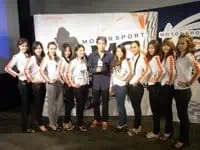An MC (formally “Master of Ceremonies”) is an individual who is tasked with pulling together all of the elements of a production, event or performance and presiding over a cohesive running order.
They take responsibility for delivering the welcoming address, introducing special guests and other speakers, and moving the event programme forward.
They must be fully versed in the running order of the show, and know the approximate times of each element of the event components.
Sometimes, unexpected things can happen during the event; perhaps the MC introduces a special guest who has decided not to appear at the last minute, or they may face a difficult or unanticipated question from the media professionals in attendance.
Either way, the MC must handle these provocative situations and make sure the event programme continues to move forward, portraying the client’s product or the event itself in a professional and well organised way.
Salary
Nearly always, the MC is paid per event, and so is free to negotiate in each case with the promoter or event manager.
At the beginning of the MC’s career, the amount of money received per event could be marginal, as the candidate may be completing jobs which include standing in a shopping mall trying to entice customers to visit a promotional stand, or something similarly low-key or low value.
A reasonable fee for this sort of work would be from £100 to £300, based on three to four hours work.
It is unlikely the MC would be required to work more than five hours per project, as the work can be exhausting.
In the case of more significant corporate jobs, the fee could be anywhere from £300 to £1500 per appearance, depending on the stature of the employing company, the location of the job and the perceived importance of “getting it right” to the hiring organisation.
Responsibilities
- Understand the running order, component times and memorise most of the script
- Be on time and appear highly presentable
- Be acquainted with the guests and understand what is required of them in terms of their participation
- Be professional, courteous and always prepared for the unexpected to occur
Qualifications
There are no formal qualifications required to become an MC, although many have experience in other areas of performance, such as in acting or modelling.
For those new to this arena, it is recommended that the candidate studies for a course which equips them for excellent public presentation, such as the highly thought of (and international) “Toastmasters” training programme.
Skills
- Be highly confident at public speaking
- Understand how to handle a microphone and have an understanding of PA systems
- Be a skilled motivator of guests
- Have knowledge of performance art, dance and accompanying skills where appropriate
- Be able to make adaptations on the fly
- Be able to memorise the running order of the show or event, which can be long and highly complex
- Have a capacity to be professional at all times
- Manage schedule to be on time and carry oneself in a very presentable and amicable way
Working Conditions
All of the MC’s work takes place in the public eye, so the candidate will succeed or fail based on their ability to handle (and enjoy) this type of work.
Things can become stressful in front of large audiences, or when things do not go to plan; for example, the running order changes on the fly, or a guest goes AWOL shortly before their stage time and the MC must successfully bridge and fill in in front of thousands of onlookers.
Experience
Many MCs begin working in a charity context, often unpaid at the outset, hosting events for small-scale organisations, corporate bodies or micro-NGOs (Non Governmental Organisations).
These types of “gigs” give the MC crucial early experience, and allow them to build their skills in front of a small audience.
If things go wrong in front of fifteen people at a tiny art gallery launch, for example, it is not the end of the world.
Career Progression
Progression from an inexperienced MC to a highly sought-after professional event Master can happen quite quickly, often within a couple of years.
In big cities with highly active corporate or artistic event calendars, there is a massive need for capable MCs, and those with appropriate experience are paid accordingly.
Career progression is made even more swiftly if the candidate is able to speak more than one language fluently; this gives them an incredible advantage, especially for MCs working overseas.
Employers
Most MCs find work either through agents or through their own social and corporate networks, so in this context, there are no major employers as such; the employer could be anyone, from a local theatre company holding a pre-show press conference, to a multi billion dollar car company which is launching a new model in front of the national press.
Image

Also known as…
- MC
- Compère
- Master of Ceremonies
- Host
- Emcee
Related Jobs
- Singer
- Producer
- Event manager
Sponsored by:
What’s it really like?
March Niyomsuk is a professional MC working in South-east Asia, and is based in Bangkok.
His experience with high value productions and television has made him one of the most highly regarded MCs in Thailand.
What made you decide or choose to get into this sort of career?
When I was young, about 12 years ago, I started off as a school’s representative engaging in a speech contest.
I practised so-called ‘public speaking’ for approximately three hours a day with my personal tutor.
Basically, this school activity was an eye-opening experience for me as it was the very first time that I got to learn many interesting and special techniques about giving effective speeches, as well as to ‘apprentice’ myself on presentation tips.
At first, I didn’t like it that much because I had to memorise long articles!
However, my perception was changed when I became the winner of Thailand’s ‘The King’s Speech’ contest in 1997; I did not look back as I realized this is probably something I could do well.
After I finished high school, I continued to practise public speaking and participated in a number of related activities that the university provided.
Thus far, it can be said that I have been involved in public speaking as an MC for more than 15 years.
Do you have a standard day or a standard type of `exercise’?
Not really.
I just like to keep myself updated with information, trends and the like.
Well, I also read a lot of newspapers and listen to the radio regularly.
What is the most common type of problem/call-out/enquiry to which you must attend?
As for being the MC, I have to be ready for any changes in the script.
That is a must!
What do you like most about the job?
I quite like the freedom of being an MC.
I occasionally work as a musical performer as well.
Comparing the two roles, being the MC has much more freedom because, despite the script, I am still able to speak in my own style, in the way I prefer, whilst being a musical performer means I am much more restricted by the role.
What do you like least about the job?
This might sound funny but sometimes I might want to wear one of those black silk slim-fitted suits from Versace whereas the organiser asks me just to wear a regular suit from the sponsor!
You have to go with whatever makes the sponsor happy!
What are the key responsibilities?
Say it right, report the truth and be there on time!
What about academic requirements? Any formal demands, eg A Levels?
I think that depends on the events.
However, a normal bachelor degree is sufficient in South-east Asia; it is the standard grade upon leaving university in Thailand.
What is the starting salary, and how does this increase over time with promotion?
It depends on the job and also the types of ceremony.
I personally categorise them into 3 groups: 1) MC as a host of a TV programme 2) MC for an event and 3) MC for a formal ceremony such as a wedding.
Each job has its own pay rate, with TV and large corporate events usually the most significant in terms of pay.
What advice do you have for someone who is looking to get into this as a career?
In order to develop a career as an MC, I have 5 suggestions.
1. Make sure you have good diction
2. You must be quick and flexible on stage.
That simply means you always have to be ready for any changes and learn to become good at solving unpredictable problems.
3. You must constantly keep yourself updated about the latest trends; read many books, magazines or listen to the news so that your creative elements as well as your knowledge are always fresh.
4. Make sure you have got some improvisation skills.
This is one of the most important keys to success for this career.
When things go wrong, you still have to lead the event, presenting important and necessary information without leaving the stage with the so-called ‘dead air’ for more than 10 seconds.
5. To keep yourself up to a suitable professional standard, you should arrive at the event early, at least 45 minutes before the meeting time, so you have the chance to read or finalise the script.
What are the most important qualities an applicant must and should possess?
The most important qualities are speaking with a “beautiful voice” and having good diction, also having good eye contact and a smart appearance.











